By Beth Armstrong
It was another warm September morning in 2015 when I was in my car driving to my next appointment for work. I was listening to the radio, as I often do, and heard the news of another, the fourth, police officer who had been shot and killed while on duty. His death was the most recent in a series of killings over the span of a few weeks that had taken place across the country last summer. Not wanting to deal with anymore horrific news, I turned off the radio and drove on in silence for the next few miles. I thought to myself, someone should do something. Someone should change the conversation. Someone should stand up and DO SOMETHING; ANYTHING. In that moment, I heard a quiet voice whisper, “You’re somebody. Why don’t you?”
I am just a wife. I just a mom. I am just an employee. I am just a volunteer. I have no ties or connections to law enforcement. What could I possibly do? I drove on towards my destination that morning with that feeling that I should ‘do something’ lingering. As if a switched flipped in my mind, I thought about the national movement of “See You At The Pole” where students across the country gather at their flag poles one morning each September and pray for their school. What if we gathered at our local police stations and did just that? Prayed. Pray for safety; pray for integrity; pray for hearts to be changed? Whatever it is that you feel led to pray for, what if we prayed?
I  posted that simple idea on my Facebook page and within minutes had dozens of comments. A few hours later, I created a Facebook event page and titled it, “See You At The Station” in honor of the national, “See You At The Pole” rallies. In 36 hours, over 30,000 people had been invited. By the end of the second week, it had spread across the country to over 30 states. Our short window of 3 weeks, led to 65,000 people being invited in 35 states, hundreds of locations and thousands of people involved. Picture after picture after picture of people encircling their local police station gathered in prayer were posted the morning of the 2015 See You At The Station event. Pictures of groups of 1 or two people, dozens of people, and groups of hundreds were shared. For the people who came to pray or to be prayed over, I believe it changed them. For me, I know it forever changed me.
posted that simple idea on my Facebook page and within minutes had dozens of comments. A few hours later, I created a Facebook event page and titled it, “See You At The Station” in honor of the national, “See You At The Pole” rallies. In 36 hours, over 30,000 people had been invited. By the end of the second week, it had spread across the country to over 30 states. Our short window of 3 weeks, led to 65,000 people being invited in 35 states, hundreds of locations and thousands of people involved. Picture after picture after picture of people encircling their local police station gathered in prayer were posted the morning of the 2015 See You At The Station event. Pictures of groups of 1 or two people, dozens of people, and groups of hundreds were shared. For the people who came to pray or to be prayed over, I believe it changed them. For me, I know it forever changed me.
It is once again September. This month, we have two different opportunities to pray for our community. For those of us involved with SYATS, we still believe that the men and women who serve and protect us across the nation could use our prayer. So, I’m inviting you to come; pray. On Wednesday, September 21 at 7:15am wherever you live in whatever state, find your nearest police station and go pray for the men and women who work there. The following week, on Wednesday, September 28, students and their families across the country will be gathering at flagpoles before the start of school to pray over their campus and all who step foot there.
We often talk about wanting ‘Someone’ to ‘Do Something’. What if that ‘Someone’ is YOU? YOU could be somebody’s miracle. YOU CAN DO SOMETHING. Sometimes it requires feeling a little unsure; a little uneasy but taking a bold step of faith and courage to make a difference. You praying for these men and women might change them and impact their life, but if you let it, it might also change you and your life. Will you join with me and pray on Wednesday, September 21 at 7:15am, wherever you live, go to your local police station and just pray? I hope to See YOU At The Station too!
If you’d like more information about SYATS or want to share it with others, please check out the Facebook page: https://www.facebook.com/seeyouatthestation/
 Beth Armstrong is married to Chris, and they have 2 kiddos: Hunter who is almost seven and Ella who just turned two. I addition to her fulltime job, she has been a member of the Junior League of Waco for 13 years.
Beth Armstrong is married to Chris, and they have 2 kiddos: Hunter who is almost seven and Ella who just turned two. I addition to her fulltime job, she has been a member of the Junior League of Waco for 13 years.
The Act Locally Waco blog publishes posts with a connection to these aspirations for Waco. If you are interested in writing for the Act Locally Waco Blog, please email [email protected] for more
By Leilani Mueller
Three nights ago Felicity, my one-year-old daughter, tried running. She was wearing her long maxi-dress, with the ruffles around the top and the bottom. She tried with all her little might to run after her two-year-old friend who had a ball. Into the long grass, she went. The thick grass was taller than her knees. She stumbled on the grass and her skirt, but stood up again, and again. She tried so hard.
Three weeks ago she took her first step in California. Three weeks ago I was living in California. Not anymore.
People ask, “How do you like Waco? What do you think of moving?”
Putting into words the experience of moving is difficult. On the one hand, there is something so ordinary about it. Yesterday, I sang to my baby and put her to bed. This morning, I went for my mile run. I dropped Nathan off at school, carpooling, the same as we’ve always done. Yet, it is different. Here, Felicity has a room of her own. The brick buildings of the classically, beautiful Baylor campus put Makita Tool company’s white, rectangular office to aesthetic shame. And the air is thick here. It sticks to you when you run. You notice it. Three weeks is not enough time to really know what I think.
As I reflect, I wonder about the story I choose to tell about this place. I find myself wondering, can I determine my experience of Waco? (Clearly, I’m motivated by the fact that my husband is a philosopher) Over the past six months, when I told people I was moving to Waco a range of responses came my way.
“It’s the armpit of Texas.”
“Growing up here is the best.”
“It’s exciting.”
“I hate it.”
“I love it.”
And the one agreed upon thought: “It’s hot in the summer.”
One place manages to elicit a range of contrary emotions. Perhaps the place is just a backdrop. It is me who gets to decide who I will be in this place. And I can love it as much as the familiar streets of Harbor City, the eclectic eateries in Los Angeles, the winding pavement of Oxford. But to love it, is also to admit that it is not those other places. And it is OK to miss them. But it is also OK to love this place, which isn’t to be disloyal to the other places I belong.
My experience of Waco is a walking one. I try to run in this thick new grass, but I will stumble sometimes.
 Leilani Mueller is a wife, mother, teacher, and writer. Formerly, a California native she now calls Waco home. She loves YA novels, Shakespeare, Victorian literature, Baylor philosophy, and Pumpkin Spice Lattes.
Leilani Mueller is a wife, mother, teacher, and writer. Formerly, a California native she now calls Waco home. She loves YA novels, Shakespeare, Victorian literature, Baylor philosophy, and Pumpkin Spice Lattes.
The Act Locally Waco blog publishes posts with a connection to these aspirations for Waco. If you are interested in writing for the Act Locally Waco Blog, please email [email protected] for more information.
By Lizette LaStrape and Becky Boggus
The Support and Empowerment Program (SEP) at McLennan Community College provides a holistic support network to single parent students seeking a degree. To learn more information about the program and its purpose you can read a previous blog post written about SEP here: “Participants in MCC Program for Single Parents are hard-working, compassionate and driven!” Today we’d like to introduce you to one of our many exceptional students.
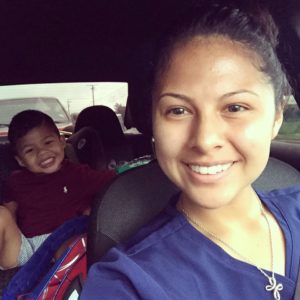 Gabriela Segura, who is known by her SEP Coaches as Gaby, is a student in the Occupational Therapy Assistant (OTA) program. Gaby is also a single parent of a three-year-old child and the first and only member of her family to pursue college thus far. She is compassionate, intelligent, and unwavering in her desire to provide a better life for herself and her son.
Gabriela Segura, who is known by her SEP Coaches as Gaby, is a student in the Occupational Therapy Assistant (OTA) program. Gaby is also a single parent of a three-year-old child and the first and only member of her family to pursue college thus far. She is compassionate, intelligent, and unwavering in her desire to provide a better life for herself and her son.
Completing a health professions program at MCC is highly demanding of a student’s time and skills. It is not unusual for Gaby to start her morning with clinicals or studying before the sun comes up and finish the day reading class materials long after her son goes to bed. In between, she plays soccer, reads her son books, cooks dinner, attends classes and study groups, and tries to catch her breath! Being a single parent in the OTA program for Gaby is “way more difficult than I thought. It takes a lot of my time.” Between having a full course load, clinical rotations and being a single parent, Gaby says that “finding the time to study and spend time with my son; just balancing everything” has been the toughest part of being a single parent student for her.
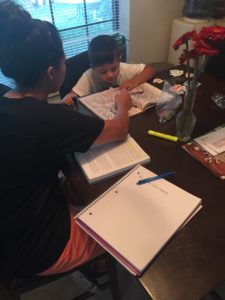 Still, through the late nights, the tests, skills assessments, and countless hours of studying she has persevered and will graduate in December 2016. A mere four months of classes, clinicals and sacrificing time away from her child remain before Gaby walks across the stage at commencement. She shared what graduation means to her – “It just means success! Success for me and him (her son), and my family overall. It will mean that I have accomplished the things that I set out to. I didn’t give up. I can accomplish anything and my son and siblings can too.”
Still, through the late nights, the tests, skills assessments, and countless hours of studying she has persevered and will graduate in December 2016. A mere four months of classes, clinicals and sacrificing time away from her child remain before Gaby walks across the stage at commencement. She shared what graduation means to her – “It just means success! Success for me and him (her son), and my family overall. It will mean that I have accomplished the things that I set out to. I didn’t give up. I can accomplish anything and my son and siblings can too.”
For first-generation students like Gaby, completing a college degree can mean changing the trajectory of their family for generations to come. Gaby states “going to college is something that I knew I had to do in order to live a different kind of life than my parents had.” Gaby shared that she didn’t receive messages about attending college from her family and states, “My mom never said, ‘Oh, you need to go to college.’ My messages came from school. That’s where I learned that education was the way to a better life. I saw how hard my mom had to work as a single parent. That’s not what I wanted. I wanted to have a job that I chose and that I enjoyed going to every day.”
In a world where first generation students are already overwhelmed with navigating the college system, add the additional responsibility of providing for a family, the lack of reliable childcare, transportation, financial resources and family support, and making it through college becomes a daunting goal. For these reasons, creating solid connections early in the college experience can make all the difference. MCC aims to provide just this type of connection for single parents and displaced homemaker students on campus through the SEP.
During her first semester of the OTA program, Gaby applied to SEP for the financial support, which the program provides in the form of childcare or transportation assistance to qualifying students. After being a part of SEP for several semesters, Gaby states, “This isn’t just help with daycare. I’ve gotten more out of this than I initially ever thought.” Gaby added, “My coach really is supportive and I like this program because the coaches are here to help with whatever you need. It’s a matter of just showing up and just asking.” In addition to financial support, SEP provides various skills-building workshops and one-on-one monthly support meetings with each student. Gaby stated, “They help with any resources that you need, and workshops are enjoyable and provide helpful information. I’ve learned how to be a better parent, how to communicate better and provide better nutrition for my son.”
While the decision to go to college was intimidating and her time as an OTA student has been challenging, Gaby shares that she has grown a lot personally through the experience – “I have proven to myself and others that I am smart. That I know more than I like to give myself credit for. That I am capable. That it’s not about the A’s, it’s about learning and understanding the material. That I am going to love what I do every day, because I already love it more, the more that I learn about it!”
To other single parents who are in college or thinking about attending college, Gaby has this to say: “If God has given you the opportunity, then just take it! God places everyone where they are for a purpose. Just never give up. Nothing is easy. The outcome is your reward.” In regard to being part of SEP, Gaby encourages other single parents by saying, “If you’re a single parent and completing a degree, you are working harder than most people. You have more responsibilities, and if you can have a program like SEP to help you get through this every day, then you can finish school!”
Every semester, SEP accepts new students with life stories similar to Gaby’s. SEP Coaches are ready and looking forward to each opportunity to take this journey of hard work and dedication with each single parent who dreams of earning a college education. SEP coaches are here to remind each potential student that, like Gaby, they are smart, capable and able of completing a college degree!
To learn more about the Support and Empowerment Program at MCC, call Lizette LaStrape at 299-8600 or Becky Boggus at 299-8569. To learn more about the Success Coach Program at MCC, call 299-UCAN (8226).
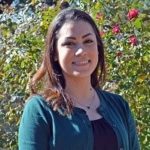 Lizette LaStrape is a native Californian, now living in Waco since 2006. She has worked at McLennan Community College for the last eight years and is passionate about higher education and helping people reach their goals. She loves spending family time with her husband and two-year-old daughter.
Lizette LaStrape is a native Californian, now living in Waco since 2006. She has worked at McLennan Community College for the last eight years and is passionate about higher education and helping people reach their goals. She loves spending family time with her husband and two-year-old daughter.
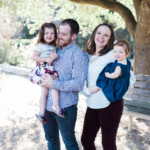 Becky Boggus is a Social Worker, a pastor’s wife, a mom, and a believer in education and strengthening Waco families. You can probably find her anywhere outside this summer: hiking in Cameron Park, chasing her kids around, and most likely eating a popsicle.
Becky Boggus is a Social Worker, a pastor’s wife, a mom, and a believer in education and strengthening Waco families. You can probably find her anywhere outside this summer: hiking in Cameron Park, chasing her kids around, and most likely eating a popsicle.
The Act Locally Waco blog publishes posts with a connection to these aspirations for Waco. If you are interested in writing for the Act Locally Waco Blog, please email [email protected] for more information.
By Jerrod Clark
Although the U.S. has only 5% of the World’s population, it has an astounding 22% of the world’s incarcerated population.[1] One out of three people in The U.S. have a criminal record.[2] 12 million Texans – nearly 45% of us – have a criminal record.[3] 4.7 million Texans have a conviction on their record.[4]
These criminal records severely restrict the chance to work and find housing. Employers and landlords can lawfully discriminate against those with convictions simply by asking applicants to “check the box” if they have a criminal record. And even if an individual doesn’t check the box, criminal background checks are at the fingertips of most employers and landlords via the convenient access through the internet.
In regard to hiring, these rules may seem reasonable at first glance, but the result is to exclude a massive pool of able-bodied individuals from being productive members of society. This creates further separation and segregation and ultimately increases crime.[5] If one cannot provide for him/herself with food and shelter, crime will be inevitable. This is a direct relationship that cannot be ignored any longer!
If one has been marked with a criminal record, the domino effect of systemic separation begins. We know that 50% of marriages end, most often due to financial stressors.[6] If one cannot get a job, the institution of marriage is at a higher risk for failure, and families are severed because of lack of income. Child Support fines, fees and interest mount and compound. Without income, a father then must go to jail if he cannot pay his financial obligations. Eventually his driver’s license will be revoked, often a final blow to one’s ability to access the few jobs that are available to felons.
Finding a place to live is another serious challenge for formerly incarcerated individuals. After an individual’s time has been served, he is released back into society to reintegrate. A foundational part of reintegration is to find a place to live. Landlords, however are legally allowed to discriminate on the basis of criminal record. Even if a formerly incarcerated person finds a landlord who is willing to rent to him, the cost is often prohibitive. Most landlords have a “3 times rule”—an applicant must have three times the rent in income to qualify and be eligible to be a potential applicant. This is a high bar for formerly incarcerated people who often struggle to get even a minimum wage job. These barriers often result in homelessness, which can have a negative effect on mental and physical health, making it even more difficult to find a job and a place to live. In other words, “the system” as it stands right now creates burdens on our community rather than alleviating them.
What can we do to change the system? I am not suggesting entitlement programs as a solution, I am suggesting equitable “in roads” and “on-ramps” or opportunities that allow one to get back on track and recover and develop from their past and present circumstance.
Here are three concrete possibilities:
- Encourage private businesses to adopt “Fair Chance Hiring Policies.” These policies do not require that employers ignore a job candidate’s past, but they do delay questions about criminal background until after the individual has had a chance to present his or her qualifications and make a case for being considered. Many employers have found that formerly incarcerated individuals make excellent employees if given the chance.
- Support bills like SB 1473which limits liability for landlords who rent to those with criminal records. SB 1473 is currently awaiting review under the Senate State Affairs Committee. Research show that crime, recidivism and homelessness decrease and production increases when housing options are increased for formerly incarcerated individuals.[7]
- Landlords could also work together to allow the working poor (including the formerly incarcerated) fair access to affordable housing. Instead of the “three times rule,” they could institute a “two times rule” for individuals who have been vetted by agencies like Mission Waco and Salvation Army. Waco landlords, please entrust organizations like these to be the “middle man” or advocate that can stand with and behind the individuals who need such a break just as Jesus stands with us.
As an educated white male with a livable wage job, my own experiences cannot fully equip me to represent the experiences of marginalized populations. However, because of my vocation and more than a decade of working with the “disqualified”– those “locked up and locked out” of society — I feel “qualified” to advocate with and on behalf of those affected by systems of oppression.
What qualifies me even more than that is what Christ did by taking my place on the Cross, making me a kid of the King and giving me citizenship to the Kingdom of God. This makes me doubly responsible to speak for those who cannot speak for themselves. I cannot be silent. I must not be afraid to speak up and speak out.
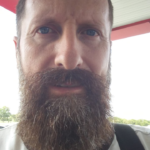 Jerrod Clark is a Texas transplant. He came to Waco in 1996 to attend school and never left. He is a graduate of Baylor University’s Diana R. Garland School of Social Work and is the Social Worker at the Meyer Center for Urban Ministries. He has been working with the homeless since 1998. He and his wife, Carolina of seven years have two daughters, Nichole and Hannah Jean. They are active participants at Church Under the Bridge.
Jerrod Clark is a Texas transplant. He came to Waco in 1996 to attend school and never left. He is a graduate of Baylor University’s Diana R. Garland School of Social Work and is the Social Worker at the Meyer Center for Urban Ministries. He has been working with the homeless since 1998. He and his wife, Carolina of seven years have two daughters, Nichole and Hannah Jean. They are active participants at Church Under the Bridge.
The Act Locally Waco blog publishes posts with a connection to these aspirations for Waco. If you are interested in writing for the Act Locally Waco Blog, please email [email protected] for more information.
Notes:
[1] http://www.prisonstudies.org/news/more-102-million-prisoners-world-new-icps-report-shows
[2] http://www.sentencingproject.org/wp-content/uploads/2015/11/Americans-with-Criminal-Records-Poverty-and-Opportunity-Profile.pdf
[3] https://www.ncjrs.gov/pdffiles1/bjs/grants/244563.pdf
[4] http://www.texaspolicy.com/library/doclib/2007-11-PP28-licensing-ml.pdf
[5] http://publicpolicycenter.texascjc.org/wp-content/uploads/2014/12/TCJC-Fact-Sheet-SB-1473-Landlord-Protection.pdf
[6] http://www.apa.org/topics/divorce/
[7] http://publicpolicycenter.texascjc.org/wp-content/uploads/2014/12/TCJC-Fact-Sheet-SB-1473-Landlord-Protection.pdf
By Natalie Garcia
It would be hard to miss what’s been in the news lately.
- The outrage over a Stanford student who received a six-month jail sentence for a rape conviction.
- Baylor University firing both its president and football coach, over an investigation showing a “fundamental failure” to appropriately respond to sexual assault incidents.
- The widespread belief that dealing with online harassment is now an inevitable part of trying to find love.
Even when the Young Adult book series Twilight first came out, it was quickly criticized for its depiction of teen relationships as glamorizing abuse, control, and manipulation.
Sometimes when we consider domestic violence, we fail to think about how a relationship might have gotten there in the first place, so let’s go a little further back – before moving in together, before marriage, before all those “relationship milestones” that come to mind.
Do you remember what you thought dating was supposed to be like, when you first started dating? Maybe you were in your early teens, maybe a little younger, maybe older. It was pretty scary, right? So much excitement and yet so many butterflies, and either too little advice, or way too much unhelpful advice (“Just follow your heart? What does that even mean?”).
Navigating romantic relationships can be overwhelming and confusing, and for so many teens, we simply don’t prepare them for what they can expect in a healthy relationship, or for how they can notice red flags in unhealthy or abusive relationships.
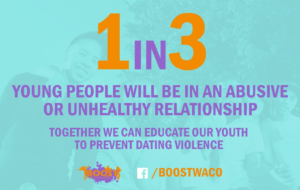 Here is the bottom line: 1 in 3 teens in the United States will be a victim of dating violence of some type – that includes physical, sexual, digital, emotional abuse, and even stalking. [1]
Here is the bottom line: 1 in 3 teens in the United States will be a victim of dating violence of some type – that includes physical, sexual, digital, emotional abuse, and even stalking. [1]
That is a rate far higher than any other type of youth violence in the U.S.
Can you imagine what might happen to the rate of domestic and dating violence in our communities if every teen knew what a healthy relationship looked like (long before they started dating!), and knew that they deserved to have one?
If that’s what we’re reaching for, what can you do to help the teens in your life be prepared to meet the challenges of dating head-on?
- Be a role model for equality, respect, and positive communication in your relationships.
- Increase your comfort level with openly discussing dating and dating violence. Easier said than done, right? But – it’s so worth it, because your comfort in sharing on such a difficult subject will make teens more comfortable too, and can decrease the stigma that comes with seeking advice on healthy dating.
- Encourage critical thinking on dating myths and gender stereotypes. Remember: Abuse is NEVER normal, and it is NEVER the victim’s fault.
- Listen! Be a safe place where teens know they can come to when they need to work through their struggles, and not be judged, lectured, or stigmatized.
- If you or someone you know is looking for help regarding an abusive relationship, you can always contact the Family Abuse Center at 1-800-283-8401.
What’s the most important thing you can take away today? Your example matters. Show the youth in your life that they deserve a healthy, loving, respectful relationship.
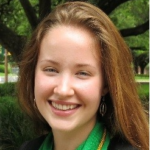 Natalie Garcia is a recent Baylor social work graduate. She and her husband have been stationed at Fort Hood since 2014. She loves science fiction and stand-up comedy. She has rescued two cats in the last six months, and thoroughly expects even more cats to find her in the future.
Natalie Garcia is a recent Baylor social work graduate. She and her husband have been stationed at Fort Hood since 2014. She loves science fiction and stand-up comedy. She has rescued two cats in the last six months, and thoroughly expects even more cats to find her in the future.
The Act Locally Waco blog publishes posts with a connection to these aspirations for Waco. If you are interested in writing for the Act Locally Waco Blog, please email [email protected] for more information.
Notes:
[1] LoveIsRespect.org. Dating abuse statistics. (http://www.loveisrespect.org/resources/dating-violence-statistics/)
by Mike Mallick
In the movie Field of Dreams, Kevin Costner is told to “build it and they will come.” On Rose Street, in the heart of East Waco, we have dreams big enough to fill a field: Dreams of proud families. Dreams of a proud history. Dreams of heroes. On Rose Street, dreams don’t come true; dreams are true. The heroes on our street built the Rose Street Path of Pride, Vision, and Justice to celebrate the greatness of humanity, the greatness of a neighborhood, and the greatness of dreams. “Build it for they have come.”
The Rose Street Path is a labyrinth, a walking path where the shade cools, the birds sing, and the route twists and turns in ever intriguing and unexpected directions, like the path of life itself. The greatness of humanity is that life is always complete, yet always advancing at the same time. As you walk along the path, your life is already complete, already heroic, and already successful, and yet each step brings about even more success. At the very center of the path is the place of completion, a place to relax on a shaded park bench and celebrate your life, a life of success, accomplishment, and gifts. It’s the place where your heroes stand proud of you each and every step of the way. Heroes you know, and heroes you don’t know. The hero within each and every one of us. God, the greatest hero of all.
Pride is having the whole world in front of you and heroes behind you. Being proud means that you lift people up without exception, no matter what, even when it hurts. On Rose Street, we don’t just talk about pride, we live it. We’re proud of parents. All of them. We’re proud of neighbors. All of them. We’re proud of you. All of you. And we’re proud no matter what. Being proud means knowing that there’s always someone standing behind you who’s proud of you. Always. Even when you don’t see it. On Rose Street, we have the courage to turn around and see who’s behind us. We have the courage to have heroes. We have the courage to Stand Proud.
Vision is the knowledge that the whole world in front of you is your gift to the heroes behind you. Our heroes (and God, the greatest hero of all) can know everything about us except one thing: They can’t know that they’re more important to us than the path before us, whatever that path may be, until we acknowledge them. On Rose Street, we turn around and look our heroes in the eye. We know that every glance behind us is a triumph over every sight in front of us. Every single one. There’s no such thing as an unsuccessful day. There’s no such thing as an unsuccessful life. Everything we do is a gift to God, to our heroes, and to the hero within us all. Everything. That’s what life is all about.
Justice is the knowledge that life is always greater than where you are, and love is always greater than who you are. Justice is standing behind all, bearing the burdens of all, in order to lift all. In the same way that life is always complete, yet always advancing, injustice has already been overcome, yet is daily being overcome. That’s simply what families do, and on Rose Street, we’re all family. Our family is our neighborhood, our city, and our world. Our family is you. On Rose Street we have the courage to lift up everyone, the just and the unjust, even when it hurts, in order to fight injustice every step of the way. We don’t talk the talk. We walk the walk. And we lift a whole city.
Walk with us and stand with us at this place of heroes! The Path is always open, and is located at 311 Rose Street, 3 blocks off Elm Avenue, on the right side of the street. Rose Street intersects Elm at Tony DeMaria’s BBQ, just past the East Waco Library. Please visit our website at www.riversidepride.org to share your dreams and share your walk! At the Rose Street Path, we stand proud. We walk proud. We make dreams come true.
 Mike Mallick is a Wacoan who stands behind everyone in the city, except in the realm of beards. He works with individuals, companies, and charities to build impact, strategies, and dreams.
Mike Mallick is a Wacoan who stands behind everyone in the city, except in the realm of beards. He works with individuals, companies, and charities to build impact, strategies, and dreams.
The Act Locally Waco blog publishes posts with a connection to these aspirations for Waco. If you are interested in writing for the Act Locally Waco Blog, please email [email protected] for more information.
By Beth Armstrong
Over the past week, I have scrolled through hundreds of Facebook posts about my friend’s children and their first day back to school photos. It’s one of my favorite times of the year seeing all of the excitement and hope about the year ahead in the eyes of these children: bright, smiling faces holding up signs about what they want to be when they grow up – all dressed up in their new school clothes and with freshly cut hair. As a mom of two little ones myself, how does that not pull at the heart strings just a little bit? One of the things we know of that helps prepare children for a terrific school year is the opportunity to read at home. And, one of the things that helps establish a life-long love of reading is the opportunity to own some books of your very own. The women of the Junior League of Waco want to help make that opportunity available to every child in Waco!
Three years ago, the Junior League of Waco began the process of selecting a single community issue to focus our efforts and resources upon. The 200 plus members chose Early Childhood Education & Development for children ages 0-3 in McLennan County to be the singular area we wanted to improve. We committed for the next 10 years to developing and expanding programs where gaps existed within the current system and establishing successful partnerships where effective collaboration and teamwork could begin. Andrew Carnegie once said, “Teamwork is the ability to work together toward a common vision. The ability to direct individual accomplishments toward organizational objectives. It is the fuel that allows common people to attain uncommon results.” As the Junior League of Waco begins a new League year focused on impacting Early Childhood Education and Development for children ages 0-3, I can think of no better quote to represent the influence that the women of the JLW are having in this targeted initiative.
We have a rich and historical tradition of giving large gifts back to our community over the past 80 years. Whether you visit Anniversary Park in Cameron Park, the refurbished Carousel at the Lion’s Park Kiddieland, or the Butterfly Gardens in the Cameron Park Zoo, there are glimpses across this city of the tireless efforts made by the women of the JLW to improve the lives of the women and children who live here. As we enter into our 80th Anniversary year, we are honored to continue this legacy by gifting the Family Health Center a check for $80,000 to fully fund the return of Reach Out and Read to the children and their parents of Waco. This initiative will put a developmentally appropriate books into the hands of every child ages 6 months-5 years who enters the doors of a Family Health Center clinic during each well-child visit.
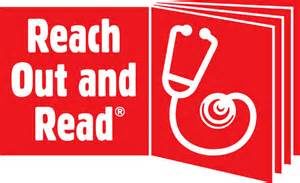 Reach Out and Read began in 1989 at Boston City Hospital. It was started by clinicians, Dr Barry Zuckerman and Dr. Robert Needlman, who were working with very high risk families dealing with poverty and violence in challenging school systems. Together with early childhood educators Jean Nigro, Kathleen MacLean, and Kathleen Fitzgerald-Rice, they introduced the first Reach Out and Read Program at Boston City Hospital (now Boston Medical Center). Dr. Needlman found that parents who are given books and literacy guidance are four times more likely to report reading aloud at home. In 5 short years, this successful program had spread to more than 34 programs in 9 states distributing almost 20,000 books. Now in its 27th year, Reach Out and Read is available in almost 6,000 sites in all 50 states and distributes more than 6.5M books to more than 4.5M children.
Reach Out and Read began in 1989 at Boston City Hospital. It was started by clinicians, Dr Barry Zuckerman and Dr. Robert Needlman, who were working with very high risk families dealing with poverty and violence in challenging school systems. Together with early childhood educators Jean Nigro, Kathleen MacLean, and Kathleen Fitzgerald-Rice, they introduced the first Reach Out and Read Program at Boston City Hospital (now Boston Medical Center). Dr. Needlman found that parents who are given books and literacy guidance are four times more likely to report reading aloud at home. In 5 short years, this successful program had spread to more than 34 programs in 9 states distributing almost 20,000 books. Now in its 27th year, Reach Out and Read is available in almost 6,000 sites in all 50 states and distributes more than 6.5M books to more than 4.5M children.
Andrew Carnegie must’ve had the collaborative efforts of the Junior League of Waco, Family Health Center and Prosper Waco in mind when he said “teamwork is the ability to work together toward a common vision.” This common vision started at the close of the last school year during a fortuitous meeting with the League’s former President, Ellen Derrick, CEO of Family Health Center Dr. Ronald Goeritz, and members of Prosper Waco and their kindergarten readiness working group. While most of our kids were out enjoying the summer break when reading books wasn’t a requirement, the members of this great team have been hard at work with the common objective of getting books into the hands of all kids and to reach uncommon results in the improvement of literacy for ALL of our children.
I know in a few weeks, we’ll have gotten back into our normal routines and will be fully engulfed in the busyness of a new fall school year, but I’d like to invite you to come and join with us as we officially kick off the Reach Out and Read program on Monday, September 26 at 3:30pm at the Family Health Center’s Tom Oliver South 18th Community Clinic (1800 Gurley Lane) where we’ll be celebrating the Junior League of Waco’s 80 years of commitment to this community.

Beth Armstrong has been a member of the Junior League of Waco for 13 years. She now serves as President of the Junior League in addition to her fulltime job. She’s married to Chris, and they have 2 kiddos: Hunter who is almost seven and Ella who just turned two.
The Act Locally Waco blog publishes posts with a connection to these aspirations for Waco. If you are interested in writing for the Act Locally Waco Blog, please email [email protected] for more information.
By Brett Greenfield
As a social worker the most consistent aspect of my job is that I am constantly learning something new. Something I have learned through working with families is to measure time not in months, weeks, days, or even hours, but moments. Life is filled with infinite moments that together craft stories, memories, purpose, and meaning for every one of us. These moments, whether shared with others or experienced in solitude have the capacity to change the course of an entire life, or merely pass by without the slightest hint of significance. When life is measured in moments beauty is found in the mundane, space is created for joy, sorrow, and every emotion in between, and hope is revealed amongst the darkest of times.
Working with foster and adoptive parents there is this moment for me that is always incredible. It is a moment during a phone call, just after asking a foster parent if they are willing to accept a child into their home…and they pause. This pause, sometimes seconds and sometimes seconds that seem like minutes, is nothing short of sacred. In these ever brief moments of silence, usually followed by questions about specifics and logistics, something truly remarkable takes place. The unspoken emotions of those moments are gravitas. Fear, courage, heartbreak, bravery, and compassion burst at every seam of the seemingly empty space. Moments like these are one of many that foster and adoptive parents experience that are often incomprehensible to others. These moments are also the first of many experiences between a child and a family, both of whom start out completely unknown to one another. The countless experiences that follow can be equally as unknown, and are just as sacred.
This pause is so significant because it is so familiar. Every person finds themselves at one point or another facing this same sense of the unknown, and these moments of pause take place when vulnerability is being asked of us. The unknown is such a vulnerable space, and yet is intricately intertwined with every relationship. Every family I encounter, be it the grandparents raising their grandchildren, the first time mother beginning a new journey of parenting, the foster family courageously raising a multitude of children even when that time is limited, the large family with many children, the parents of children with special needs, the adoptive families weaving together their own family story; any family with any story finds themselves confronted with the vulnerability of the unknown at many points along the journey.
The willingness families to wade deep into the vulnerability of embracing children is something I will forever cherish and admire. My hope is that I offer more than just admiration, and also provide support for this vulnerability as well. Experts in child welfare have long studied the effects of secure attachment in children. Secure attachment is something often taken for granted, until it is somehow lost. Many families find themselves confronted with the challenge of loving and embracing a child deeply in need of the nurture and care characteristic of secure attachment. Through these journeys of loving children a common thread is woven. Families seek a place for their stories to be heard and hope to be found.
The task of sharing stories and searching for hope can be daunting and intimidating, but hope has a way of making itself known. MCH Family Outreach is offering a new program for families of all shapes and sizes called Circle of Security. This 8-week small group program is designed to give parents and caregivers the opportunity to understand their story in new ways that reveal the hope already present in their lives. If you or someone you know is interested in meeting with other parents for this type of opportunity, please contact MCH Family Outreach at 254-750-1263 or email Brooke Davilla at [email protected].
Classes can be offered at a variety of locations and for groups of 8-10 parents. Examples of groups can be:
- Foster and Adoptive Parents
- Parents of small children
- Parents of older children
- Single Parents
- Parents of blended families
- Parents of children with special needs
 Brett Greenfield is social worker in Waco, TX. He is a graduate of the Diana R. Garland School of Social Work and currently serves as a Case Manager with MCH Family Outreach. He is passionate about working with families in the community and offering community education in trauma-informed care, attachment, and family relationships.
Brett Greenfield is social worker in Waco, TX. He is a graduate of the Diana R. Garland School of Social Work and currently serves as a Case Manager with MCH Family Outreach. He is passionate about working with families in the community and offering community education in trauma-informed care, attachment, and family relationships.
The Act Locally Waco blog publishes posts with a connection to these aspirations for Waco. If you are interested in writing for the Act Locally Waco Blog, please email [email protected] for more information.
By Becky Boggus
During the first week of each semester at McLennan Community College, single-parent college students in the Support and Empowerment Program (SEP) gather in a conference room for Program Orientation. Among the refreshments, name tags, and ice breaker questions, there is something deeper going on: a large group of single parents are all gathered in a room with a unifying goal of earning a college degree. It will entail a huge sacrifice of money, time, and energy – resources they are already desperately short on.
My name is Becky Boggus, and it’s my privilege to work with these amazing single-parent students at McLennan Community College in Waco. I work with students in a grant-funded program called the Support and Empowerment Program. We are federally funded by the Carl Perkins Grant and have been on MCC’s campus since 1979. Over the last 36 years, we have helped over 7,000 students.
Single-parent college students are one of the most at-risk groups of students for non-completion of a college degree. They are more likely to work while in school, be low-income, be first-generation college students, and are less likely to be college-ready upon entry. They juggle all of the usual high-stress demands of college while also solely meeting the emotional and financial needs of a family.
Equipping and empowering single parents to complete their college education changes the trajectory of an entire family system, leaving an impact for generations. We know this first-hand because behind every parent succeeding has a child watching, learning the value of education and hard work.
Nationwide, just about 12% of single-parent community college students complete an Associate’s degree within 6 years of starting it. Yet, research demonstrates that at-risk college students often fail academically due to clusters of personal and financial barriers, rather than a lack of academic skills (Adelman & Taylor, 2008, 2010). To put it simply, the stress outside the classroom affects a student’s performance inside the classroom. A mom who can’t feed her kids will never be able to fully focus on her history exam. Exclusively addressing academic concerns falls short of helping these students be successful.
Students who are involved in SEP are assigned an SEP Coach upon entry to the program. The coach meets with every student at least once per month to provide holistic support—from parenting advice to career counseling, community resource connections, and self-care training. They are the cheerleader, the listening ear, and often times the shoulder to cry on. Ideally, this coaching relationship is established immediately upon entrance to college and lasts until graduation, establishing consistent care and support in a student’s life. The Support and Empowerment Program also provides various workshops throughout the semester. Students gain skills in parenting, resume-building, managing their money and stress, accessing the court system, and studying more efficiently. We are also able to provide students with monthly financial support to help them alleviate stress and make ends meet during their time as a student.
The great news about SEP is that it works. With these basic supports established, our students flourish. They graduate at rates 2-3 times the national average, report lowered levels of stress, more confidence in their parenting skills, and greater ability to communicate with their faculty members. It’s an honor to walk alongside these students as they succeed. They are the hardest-working, most compassionate, driven people I know.
Our staff serves as support to the overworked single parent. The interventions we use are simple, intentional and relationally-driven. The students served by the Support and Empowerment Program vary widely in age, number of children, marital history, socioeconomic status, and educational experiences. Yet a common sentiment is often expressed by those in SEP: “I don’t feel alone anymore. I know I can do this.” Investing in personal support translates into academic success and that is what SEP works to accomplish every day.
To all the people reading this who thought furthering your education was out of reach: I’m here to tell you that it’s not! It is never too late to take on new challenges and reach new goals; we’re doing it together at MCC and we are here to help you along the way! We can’t wait to meet you!
Want to learn more about the Support and Empowerment Program? Call Becky Boggus at 299-8569 or Lizette LaStrape at 299-8600. To learn more about the Success Coach Program at MCC, call 299-UCAN (8226).
 Becky Boggus is a Social Worker, a pastor’s wife, a mom, and a believer in education and strengthening Waco families. You can probably find her anywhere outside this summer: hiking in Cameron Park, chasing her kids around, and most likely eating a popsicle.
Becky Boggus is a Social Worker, a pastor’s wife, a mom, and a believer in education and strengthening Waco families. You can probably find her anywhere outside this summer: hiking in Cameron Park, chasing her kids around, and most likely eating a popsicle.
The Act Locally Waco blog publishes posts with a connection to these aspirations for Waco. If you are interested in writing for the Act Locally Waco Blog, please email [email protected] for more information.
*******
For more information on how to help single-parent and at-risk college students be successful, check out these great sources:
Adelman, H.S. & Taylor, L. (2010). Mental health in schools: Engaging learners, preventing problems, and improving schools. Thousand Oaks, Calif.: Corwin Press.
Adelman, H.S., & Taylor, L. (2008). Rebuilding for learning: Addressing barriers to learning and teaching and re-engaging students. New York: Scholastic, Inc. This book is also available (PDF, 5.75MB) online.
America’s Promise Alliance. Don’t call them dropouts. Retrieved May 21, 2014, from http://gradnation.org/report/dont-call-them-dropouts
Goldrick-Rab, A., & Sorensen, K. (2010). Unmarried parents in college. Fragile families, 20(2), Retrieved from http://futureofchildren.org/publications/journals/article/index.xml?journalid=73&articleid=536§ionid=3692
Huelsman, M., & Engle, J. (2013). Student parents and financial aid. Institute for Women’s Policy Research, Retrieved from http://www.iwpr.org/initiatives/student-parent-success-initiative/resources-publications
Miller, K. (2010). Student parents face significant challenges to postsecondary success. Institute for Women, IWPR #C376, Retrieved from http://www.iwpr.org/initiatives/student-parent-success-initiative/resources-publications
Schumacher, R. (2013). Prepping colleges for parents: Strategies for supporting student parent success in postsecondary education. Institute for Women’s Policy Research, Retrieved from http://www.iwpr.org/initiatives/student-parent-success-initiative/resources-publications
By Craig Nash
From the moment their son Bennett was born and they discovered he had Cystic Fibrosis, my friends Breck and Brian have worked tirelessly to provide him with the tools necessary not just to survive, but to thrive with the chronic disease. Daily protocols of medication and time spent in “The Vest,” a contraption used to clear mucus from Bennett’s airways, take up much of their time and energy. In addition to this, hospital stays have become a part of life in their household. At the same time they are tending to his immediate needs, the Gamels have also taken on the cause of finding a cure for CF,– participating in fundraising walks (hundreds are part of Bennet’s Brigade,) educating the public on CF, advocating for research dollars, and working to ensure that “the system” works for Bennett and others with the disease.
Breck and Brian fight like hell today to keep the 6 year old Bennett alive, but also to ensure that the 60 year Bennett will be living life to the absolute fullness, and to bring the same quality and duration of life to others like him.
As I was recently in my truck on the way to speak to a group in Central Texas about food insecurity, I was reflecting on the work of Brian and Breck as it relates to alleviating hunger in our area. Like the administering of medication and daily chest treatments, there is the “on the ground” work of making sure people have the food they need for today, and there is the “in the air” work of fixing systems designed to alleviate hunger, so they can work better for our neighbors in the future.
In my short time working on the issue of childhood hunger in our area, I have discovered that Waco does the “on the ground” work well. Very well, in fact. We see a need and harness our resources to meet the need as quickly as possible. Non-profit organizations, schools and churches operate numerous food pantries in town to address immediate barriers that may be between people and the food they need. Pack of Hope helps fill in the nutritional “weekend gap” children face between school days, and rarely a day week goes by when I don’t see Good Samaritans handing out food to our homeless population. Meals & Wheels provides an invaluable service to seniors, and I have written in this space before, the Child Nutrition Departments at our local schools work tirelessly to feed our students year-round.
Waco fights like hell to feed people today.
But I wonder, could we be fighting harder “in the air” to fix the systems that contribute to people being hungry tomorrow? I think we can be.
In her blog documenting the fight against Bennett’s CF, Breck has given tips on what they have learned so far with regard to their battle. Tip #2 is “Become an Expert,” and part of becoming an expert, she writes, is asking lots of questions of medical providers. She writes, “we ask lots of questions until we feel satisfied we fully understand the reason behind the new treatment, test or medication. And then we often Google more information so we can better grasp how this fits into the overall care of Bennett’s disease.”
I think we should all be employing this tactic with our government officials who pass legislation regarding nutrition assistance programs, administrators and nutrition departments of our schools, and of others who are working at feeding our communities. Ask questions, lots of them.
Ask if a program is working.
When you get an answer, ask for the data.
Ask school administrators if they are making use of every resource at their disposal to ensure that when kids are under their care, they are being fed.
If they say “no,” ask “why not,” and “how can I help?”
If they say “yes,” ask to see the numbers. If they are providing meals that aren’t being accessed, ask if there are better ways to bring children to the meal or, better yet, bring the meal to the children.
It’s an election year—Don’t let a town hall meeting go by when you fail to ask a candidate what his or her plan is to address hunger. When they quickly try to pivot to their talking points, don’t let them.
We are a “churchy” place—Ask your pastor what he or she thinks the mission of your congregation is with regards to hunger.
Be gentle and empathetic. Be respectful of the expertise of the person you are asking the questions of, recognizing that they swim in these waters every day.
But be a little annoying.
I imagine those on the receiving end of Breck and Brian’s questions often get annoyed, but I know that Bennett’s life, both today and 60 years from now is worth it. And if we can alleviate hunger in our city, or even just put a big dent in it, I think annoying some people might also be worth it.
***
(To learn more about Bennett and CF– http://www.initforbennett.com/p/bennetts-story.html)
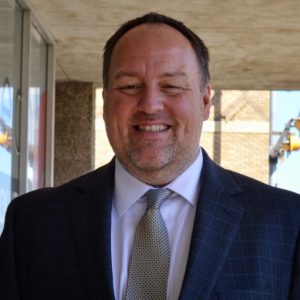 Craig Nash has lived in Waco since 2000. Since then he has worked at Baylor, been a seminary student, managed a hotel restaurant, been the “Barnes and Noble guy,” pastored a church and once again works for Baylor through the Texas Hunger Initiative. He lives with his dog Jane, religiously re-watches the same 4 series on Netflix over and over again, and considers himself an amateur country music historian.
Craig Nash has lived in Waco since 2000. Since then he has worked at Baylor, been a seminary student, managed a hotel restaurant, been the “Barnes and Noble guy,” pastored a church and once again works for Baylor through the Texas Hunger Initiative. He lives with his dog Jane, religiously re-watches the same 4 series on Netflix over and over again, and considers himself an amateur country music historian.
The Act Locally Waco blog publishes posts with a connection to these aspirations for Waco. If you are interested in writing for the Act Locally Waco Blog, please email [email protected] for more information.
